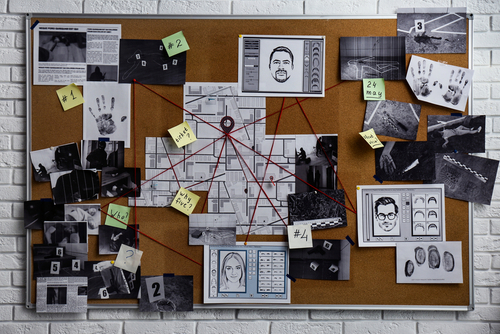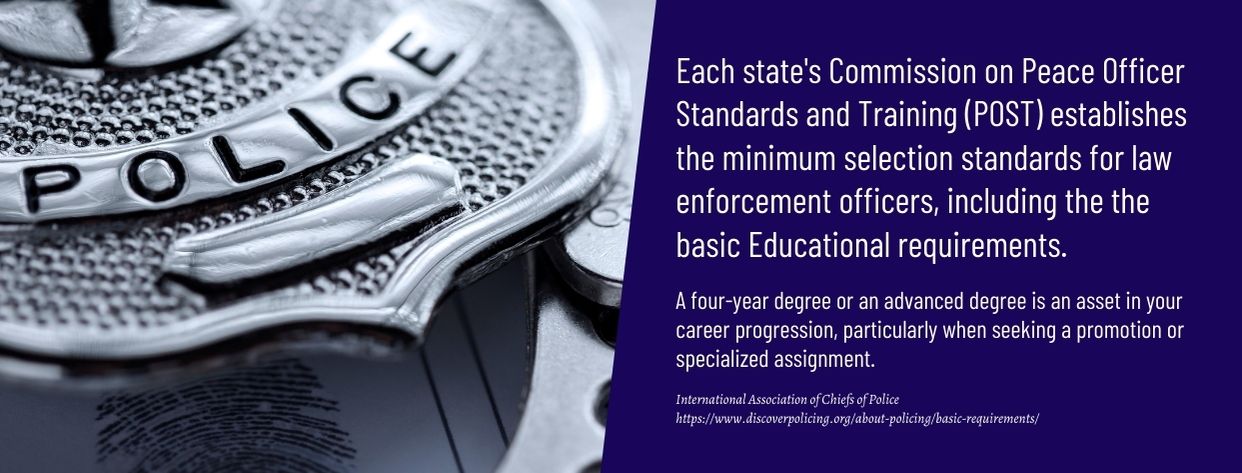Find Your Perfect School
The Police Officer or Detective career paths are connected in many ways, as both primarily focus on protecting the public. They are admirable positions that provide a sense of accomplishment, service to others, lucrative pay, and plenty of chances for promotions.
Many young children have had dreams of being Police Officers someday; although, the job can be perilous and stressful. In the “grown-up” real world, it’s not as easy as you may think! If you are interested (and determined), check out the information below to reach your career goal in law enforcement.
Quick Summarization:
What would we do without the protection of our local Police Officers or a Police Detective? Police departments all over the U.S. are welcoming police officers and detectives to their workforce. If you are interested in a career in law enforcement, this rewarding career choice is for you!
Click on these Quick Links to check out the school of your choice:
Lackawanna College
Southern New Hampshire University
University of Nevada – Las Vegas
Arizona State University
Missouri Southern State University
University of New York (SUNY) Canton
Glendale Community College
Fox Valley Technical College
West Virginia University
Liberty University
POLICE OFFICER & DETECTIVE JOB DESCRIPTION AT A GLANCE
Police Officers and Police Detectives have a very serious job. Their main concern is obvious; they protect people and property. And, that can be accomplished in many ways, such as patrolling assigned areas, gathering evidence, responding to non-emergency and emergency calls, searching and arresting criminals, as well as many other responsibilities.
Police Officers and Detectives must keep meticulous and detailed records as they are often requested to testify in court. They carry handcuffs, radios, and guns.
POLICE OFFICER vs DETECTIVE
As the primary responsibilities of both are the same (to protect and serve the public), each often has different job descriptions, although they overlap at times.
Detectives are considered members of law enforcement that investigate crimes, usually by gathering evidence and questioning suspects, informants, or witnesses. They can arrest a criminal… just like a Police Officer.
Generally, the role of the Detective is considered a promotion over being a Police Officer; therefore, you should expect to serve your time as an officer before expecting a promotion to Detective.
In some jurisdictions, Police Detectives have authority over Police Officers; however, this is not true in every district.
ARE YOU IN GOOD PHYSICAL SHAPE?
If you intend to enter the police academy, you should be prepared, right? There are specific physical skills you should master, such as sit-ups, bench presses, running, pull-ups, deadlifts, box jumps, squats, and more. Police Detectives and Police Officers often must apprehend criminals using physical strength and stamina.
Methodology
Let us help you find the best programs for becoming a Police Officer or Detective; one that fits your requirements for beginning your career or for career advancement! Our researchers at PremiumSchools.org utilize these indicators of excellent academic standards to locate exceptional certificate, associate, or bachelor’s degree programs designed just for you. These factors include:
- 100% web-based, on-campus, or hybrid classes for flexible or convenient attendance, in addition to, in-person training,
- Rigorous, yet engaging and innovative training in the field of law enforcement and criminal justice coursework that takes into account the readiness of students to take the next step in their careers,
- Outstanding faculty consisting of experts in the field of law enforcement,
- Esteem among academic agencies, industry organizations, and journalistic resources,
- Stellar reviews and feedback from alumni and students,
- Offers a wide range of scholarships, grants, and other financial support programs for eligible students.
To learn more about our selection process, see our Methodology page.
10 BEST SCHOOLS FOR A POLICE OFFICER AND DETECTIVE DEGREE
Lackawanna College
(On-campus) AS in Criminal Justice
Lackawanna’s AS in Criminal Justice program welcomes individuals interested in careers in the police force, including officers and police detectives. Many graduates also take on non-police jobs like emergency dispatchers and corrections officers. The associate degree is an excellent step for entry-level jobs, career advancement, or higher studies, such as a bachelor’s degree.
The extensive coursework includes courses in criminal law, criminology, criminal investigations, and criminal justice ethics. Both the quantitative and qualitative aspects of a criminal justice career are emphasized. It is evident in courses like quantitative methods and critical analysis concerning the US criminal justice system.
Students understand the fundamentals of the US police, judiciary, and corrections systems through their academic coursework, including their histories and relationships. Students can also engage in meaningful discussions about the roles of police and the community in crime prevention.
Lackawanna provides working professionals with the opportunity to earn an associate degree as part-time students. However, the Accelerated Part-Time Program has a faster pace than its traditional counterparts since students can complete it in just over two years. Students take their classes in a traditional classroom setting and online.
After program completion, graduates may choose to enroll in the Lackawanna College Police Academy and earn a BS in Criminal Justice degree.
Programs Offered:
- Agribusiness
- Culinary Arts
Kickstart your career with an AS in Criminal Justice degree from Lackawanna! Prospective employers will appreciate your competency on the job.
Southern New Hampshire University
(Online) AS in Criminal Justice
The best thing about SNHU’s AS in Criminal Justice program is that it’s a great fit for fresh high school graduates and working professionals. Their common desire to become police officers and detectives acts as a bond during their stay in the 60-credit online program.
Students with a previously earned associate degree or law enforcement training can request credit transfers and, thus, earn the degree sooner.
Applications are made easy since there are no application fees and standardized scores required for admission. Graduates may also transfer their earned credits to a four-year BS in Criminal Justice program.
Students benefit from the nearly equal emphasis on transferable skills through general education courses and technical skills through major courses.
The major courses establish a strong foundation in US criminal law and its criminal justice system including the police, courts, and corrections facilities. These courses develop several skills simultaneously, too, such as statistical analysis, effective communication skills, and research literacy.
SNHU’s instructors have impressive professional credentials, too, including working in police departments. Aside from classroom instruction, their work also involves career guidance for students.
Programs Offered:
- Graphic Design
- Data Analytics
Earn the prestigious AS in Criminal Justice degree from SNHU and impress prospective employers about your suitability for police work!
University of Nevada – Las Vegas
(On-campus) BA in Criminal Justice
Students in UNLV’s BA in Criminal Justice program develop their critical understanding of the US criminal justice system, crime, and delinquency during their two-year studies. The 120-credit program tackles a wide range of subjects in fulfillment of the primary goal.
These include social controls, crime prevention and reduction, and case processing that, in turn, are designed as preparation for real-world situations.
Graduates are known for their proficient capacity for discussions about the legal and criminal systems and their major components, including the police and courts. In the uniquely American context, their knowledge of crime makes them attractive to police departments looking for police officers and aspiring detectives.
Since criminal justice is a multidisciplinary field, students also acquire skills related to social science research and its practical applications. The qualitative and quantitative facets of social science research are also highlighted, so students become well-versed in the entire process. Students must demonstrate a proficient ability to research from start to finish or from conceptualization to conclusion.
Students must also comply with seminar requirements in their freshman and sophomore years.
Programs Offered:
- Anthropology
- Architecture
Attention potential Police Detectives and Officers – Entry-level jobs and career advancement opportunities await you with a BA in Criminal Justice degree from UNLV! Check out the program and take the first step in your career.
Arizona State University
(Online) BS in Criminology and Criminal Justice
ASU Online offers an exceptional BS in Criminology and Criminal Justice degree program for young students and adult learners alike. The convenient online format means flexible scheduling for working professionals, while the 7.5-week duration for each class means less time pressure. There are a total of 40 classes comprising the 120 credit hours that students must complete for graduation.
Careers in criminal justice, including police and detective work, have their complex challenges. Students must then acquire the technical and transferable skillsets for solving these challenges, even maintaining calm in a stressful environment. Effective communication skills are developed alongside analytical, critical thinking, and research skills.
Academic explorations in diverse topics are also part of the student experience. On the cards are gender and crime, criminal justice policies and practices, and race and crime. Electives don’t just customize your degree but also broaden your horizons, and the choices include community corrections, white-collar crime, and sex crimes.
Online students benefit from the same curriculum and quality of instruction as their on-campus counterparts. Even the diploma doesn’t make a distinction! Graduates carry the prestigious ASU name and find employment in law enforcement occupations and forensics, cybersecurity, and criminal investigations.
Programs Offered:
- African and African American Studies
- Biological Sciences
ASU Online is among the best places to earn a BA in Criminal Justice, a valuable credential in law enforcement, and a criminal investigation career needed to be Police Officers or Police Detectives.
Missouri Southern State University
(On-campus) AS in Law Enforcement
MSSU accepts individuals interested in becoming a police officer or detective, a private investigator, or a border patrol officer into its AS in Law Enforcement program. Unlike many associate programs, it has a practical training component that strengthens the theoretical knowledge from academic courses. The curriculum emphasizes criminology and corrections, so it’s also a stepping stone toward a bachelor’s degree.
The learning outcomes are in line with the program’s rigorous study of law enforcement principles and practices. Students learn about legal and ethical applications of criminal law, the meaningful discussions of the criminal justice system, and the preparation of relevant documents. The balance between technical skills in law enforcement and transferable skills for the modern workplace is among the program’s hallmarks.
MSSU, a member of the Missouri Peace Officer Standards and Training (POST), offers two options:
- Option A is the AS in Law Enforcement
- Option B is the AS in Law Enforcement with eligibility for the Basic Law Enforcement Academy
Both require the completion of 60 credits for graduation. POST is the State of Missouri’s regulatory program for licensing peace officers, among other responsibilities.
Programs Offered:
- Medical Laboratory Science
- Physics
With the AS in law Enforcement degree, you have the opportunity to establish a successful career as a police officer and, in the future, as a detective. Check out the program today!
State University of New York (SUNY) Canton
(Online) BTech in Criminal Justice with a Concentration in Law Enforcement Leadership
As the country’s largest comprehensive system of post-secondary institutions, SUNY offers more than 7,660 programs, of which the BTech in Criminal Justice is a popular one. The Law Enforcement Leadership concentration attracts three types of students:
- Freshmen students who want to establish a career in law enforcement
- Holders of an associate degree in criminal justice or criminology
- Currently employed professionals seeking career advancement opportunities through higher education
Students learn two sides of the law enforcement coin – public service and business management. The result is a college education that can be applied in the public and private sectors, such as police officers, police detectives, or private investigators.
Students also prepare for leadership positions, such as supervisors in police departments, through the coursework.
The online study format is convenient for working professionals to earn their degrees at their own pace. The program’s interdisciplinary approach means an equal emphasis on law enforcement, criminal justice, and management. Students develop their leadership skills, including management of resources in law enforcement settings.
Law enforcement professionals also lead some of the classes. Students have the opportunity to attend a law enforcement academy during their senior year or eighth semester.
Programs Offered:
- Criminal Justice
- Web Development
- Engineering Technology
The best professionals have earned the BTech in Criminal Justice with a Concentration in Law Enforcement Leadership degree from SUNY for good reasons! You will benefit, too, from it, so check it out now.
Glendale Community College
(On-campus) AAS in Forensic Science
GCC’s AAS in Forensic Science program consists of 60-65 credits with general education courses, electives, and majors. Students gain fundamental skills in forensic science, particularly concerning crime and criminal activities.
Since forensic science is a specialized field, students learn trade-specific skills vital in their future jobs. These include taking photographs of crime scenes, including the evidence, and their collection, storage, and preservation.
Students can earn certificates in:
- Fingerprint Identification and Photography
- Crime Scene Investigation
The technical skills-related courses prepare students for the demanding and stressful nature of criminal investigation. Students must be able to handle physical evidence according to protocols, from collection to analysis. The effective and efficient use of technology in handling physical evidence must also be exercised at all times.
Students prepare for the professional environment of laboratories, too, through hands-on training. Law, leadership, and ethics are emphasized, too, because every workplace decision and action has legal and ethical consequences.
Students must also learn effective communication and collaboration skills since forensic science involves several stakeholders. Government agencies, including law enforcement units, the victims and their families, and the media, are just a few examples.
Programs Offered:
- Animation and Time-based Media
- Law and Policy
Get ahead on your criminal justice career with an AAS in Forensic Science degree from Glendale!
Fox Valley Technical College
(Online) AAS in Forensic Science
FVTC’s AAS in Forensic Science degree program highlights the use of scientific investigation in law enforcement, particularly in police and detective work.
The courses are an introduction to the complexities of constitutional and criminal law, crime scene management, and forensic science fundamentals. With every course, students learn more specialized skills in several areas, including:
- Identification, collection, and preservation of evidence
- Critical thinking and analysis of evidence relevant to the crime
- Identification of various types of evidence, including fingerprints, tool marks, and DNA
- Investigation of car crash sites
- Communication of results and other pertinent matters to concerned authorities and persons
There are two concentrations offered – physical and digital evidence. These concentrations are intended to enhance professional credentials and, thus, bring better opportunities. Graduates are eligible for entry-level positions in crime laboratories and other law enforcement agencies.
Aside from the academic coursework, there’s an internship component. Students must complete the internship requirements before they can be awarded the degree.
Applicants must undergo an academic skills assessment to be considered for admission. The assessment may be a high school diploma with a 2.75 GPA, an associate degree, or standardized tests.
Transfer of previously earned credits into the AAS program is also possible. Graduates may also transfer their earned credits from the AAS degree to a bachelor’s degree.
Programs Offered:
- Information Technology
- Aviation
Get specialized technical training through FVTC’s AAS in Forensic Science program! Your job prospects will be so much better with it.
West Virginia University
(On-campus) BS in Forensic Chemistry
WVU’s Department of Forensic and Investigative Science is a recognized national leader in its field, and its BS in Forensic Chemistry program is among the best. The program features dedicated faculty members with impressive professional credentials, including experience and state-of-the-art facilities. WVU has the largest crime scene complex in the country, a ballistics laboratory and latent fingerprint facilities.
Students praise the quality of these state-of-the-art facilities where learning specialized technical skills becomes more effective. Research projects are possible at the forensic ballistics research building and the dedicated laboratory space with modern instruments. Students and instructors can collaborate on these research projects.
The robust hands-on approach permeates the program, from the academic coursework to the laboratory sessions. The rigorous science-based curriculum emphasizes the use of STEM in forensic science. With such a challenging curriculum, graduates are more than prepared for the demanding work in forensic chemistry and related disciplines.
Internship placements also abound for students! These placements strengthen the students’ practical skills while also exposing them to professional work environments. Students can also attend meetings and make presentations in local and national venues with the full support of the college. Faculty members also invite students to research programs.
Programs Offered:
- Chinese Studies
- Computer Engineering
Go for the best education by enrolling in WVU’s BS in Forensic Chemistry program ASAP!
Liberty University
(Online) BS in Criminal Justice – Crime Scene Investigation
Liberty’s baccalaureate degree programs are characterized by their convenient 100% online format and faster-than-average completion time – about 3.5 years on full-time enrollment. This is true for its 120-credit BS in Criminal Justice – Crime Scene Investigation program.
Each course lasts for eight weeks, and every course is taken on its own (i.e., single course format), resulting in more focus on achieving its specific learning outcomes.
Admitted students may also request for transfer of credits, particularly for general education courses. Up to 90 credits, or 75% of the program’s total number of required credits, can be transferred. Credits from an associate degree and law enforcement training are eligible for transfer.
Introduction to Forensics, Crime Scene Management, and Criminal Investigations are a few of the courses in the curriculum. Students are advised to follow a sequential program of study to earn the degree within the target time.
With forensic science being an interdisciplinary field of study, the program enables students to develop their scientific knowledge, technical skills, and analytical ability. Compliance with the law, adoption of professional ethics, and professional competence distinguish Liberty’s graduates from the rest of the pack.
Programs Offered:
- Applied Psychology
- Political Science
Unlock your potential career in police and detective work with Liberty’s BS in Criminal Justice – Crime Scene Investigation degree!
FREQUENTLY ASKED QUESTIONS
What types of law enforcement should I consider?
If you are interested in working in the field of law enforcement, becoming a Police Officer or Detective is not your only option. Here are a few suggestions:
- FBI Agent
- Fish & Game Warden
- Deputy Sheriff
- Border Patrol Agent
- State Trooper
- Transit & Railroad Police
- Special Jurisdiction
- Air Marshal
- Secret Service Agent
- Immigration Inspector
- Crime Scene Investigation
Are there other jobs in law enforcement that are not so “hands-on” with criminals?
Yes, many are interested in helping to protect the public but are not prepared to work closely with criminals. Take a look at these options:
- Handwriting Examiner
- Forensic Accountant
- Firearms Specialist
- Fingerprint Analyst
- Evidence Technician
- Linguist
- Crimes Scene & Lab Technician
- Criminal Analyst
- Surveillance Specialist
- Court Reporter
- Computer Crimes
- Attorney
- Paralegal
How do I become a Police Officer or Detective?
Becoming a Police Officer is a relatively straightforward process as far as the required education is needed, although physical stamina is required in order to pass training. In addition, if you are interested in eventually obtaining a promotion, additional post-secondary education, such as a bachelor’s degree, may be required.
So, generally speaking, you will need to graduate from your agency’s police academy training program. Next, on-the-job training is crucial, perhaps offered through a cadet program.
To qualify for a police academy, you will need a high school or equivalent diploma to begin. However, some agencies may require some college credits in law enforcement or criminal justice before beginning.
What will I learn in my training to become a Police Officer?
Besides physical training, you will receive coursework in:
- Police Ethics
- Traffic Control
- First Aid
- State & Local Laws
- Patrolling
- Firearm Use
- Self-Defense
- Emergency & Non-emergency Response
- Civil Rights
- Conducting Investigations & Criminal Activity
- Gathering Evidence
- Defensive Driving
- And, much more!
How much money does a Police Officer and Detective earn?
As of May 2022, the Bureau of Labor Statistics reported the median annual wage of a Police Officer and Police Detective as $69,160 annually, with the highest 10% reportedly earning upwards of $109,580 per year, depending on experience, job location, and job title. Detectives traditionally earn more than Police Officers. Large police departments may pay more depending on experience and location.
Is there a demand for Law Enforcement personnel?
The Bureau of Labor Statistics states a positive projected job growth rate of 3% between 2022 and 2032. Whether an area’s crime rate is falling or on the rise, Police Officers, Criminal Investigators, and Detectives will be needed to fulfill positions of retirees and additional law enforcement needs.
What kind of post-secondary education is good to have if I want to be a Police Officer or Detective?
If you would like a college education before entering the police academy, earning a Bachelor’s degree in Criminal Justice is ideal. There are others to consider, such as a degree in Psychology, Homeland Security, Political Science, Law, Forensics, or Public Safety, for example.
What kind of work environment should I expect as a Police Officer or Detective?
The life of a Police Officer, Police Detective, or any law enforcer can be very dangerous, as they work accidents or crime scenes that can be brutal and traumatizing to the average person. Although stressful, many who find serving the public in this capacity find their work very rewarding.
In addition, you can expect to work in adverse weather conditions and face high-risk situations that could result in physical injuries and/or mental anguish. In 2021, 472 Police Officers perished in the line of duty, an increase of 323 from 2019.
In most cases, a Police Detective and other law enforcement personnel work full-time, including overtime, on-call hours, and holidays.
What skills or personality traits make a good Police Officer or Detective?
Police Officers, in addition to Detectives and Criminal Investigators, must have excellent communication skills, perceptiveness, leadership skills, good moral judgment, and exceptional physical stamina. If you are familiar with a foreign language, it will be useful. Problem-solving skills are a must in any police department.
And, perhaps most importantly, law enforcement officers need to be passionate about their job and empathetic toward those they are protecting.
KEY POINTS TO PONDER
- Police Officers play an important and crucial role in deterring crime; therefore, a career in law enforcement provides rewarding opportunities.
- A Police Detective also adds knowledge and skills to apprehending the bad guys, especially during ongoing investigations.
- Law enforcement professionals investigate and collect evidence at violent crime scenes, deal with violent street gangs, solve missing persons issues, conduct criminal profiling, interview witnesses, and much more.
- Police Officers must have the proper credentials to fulfill the role of a Police Officer and then a Police Detective. Certificate, Associate, and Bachelor’s degrees are available in the field of law enforcement.
- Due to the rigorous demands of the job, the Police Officer and Police Detective must be in exceptional physical health. Good mental health is a must, as well.
- Most police departments require their own educational stipulations to qualify for their positions. Check with your local police department for details. A local law enforcement agency often provides on-the-job training. Specialized training is also available. A valid driver’s license is required, too.
- Law enforcement officers are the backbone of every community.
Before you go… Check these out:












